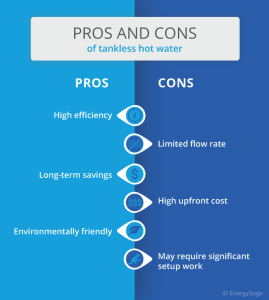Tankless Water Heater Pros and Cons
Go Back To Previous PageEvery homeowner wants to reliably and efficiently get hot water whenever they need it. In recent years, the tankless water heater has become an increasingly popular option among homeowners who desire hot water “on demand.”
As with any appliance or plumbing fixture, however, a tankless water heater has pros and cons.
Before scheduling an installation, exploring some of the unique advantages and disadvantages of tankless units may be helpful.
What are the Pros of Installing a Tankless Water Heater?
First, consider a few tankless water heater pros.
A Higher Level of Efficiency
Compared with traditional water heaters, tankless units tend to be much more energy efficient. The Department of Energy has studied tankless units and found them to be as much as 50 percent more efficient than conventional tank models!
much as 50 percent more efficient than conventional tank models!
Why is this the case? Simply put, tankless heaters eliminate the need for large storage tanks. Those tanks are highly susceptible to standard energy loss, as the stored water gradually becomes cooler and sacrifices some heat energy.
Bottom line: Going tankless can be an effective way for homeowners to go green and potentially reduce their utility bills.
Long-Term Cost Savings
While installing a tankless heater certainly involves some upfront costs, homeowners can also realize some savings over the long haul.
As noted above, part of that comes down to energy efficiency and lowered utility costs. But part of it comes from the fact that tankless heaters usually last longer than conventional ones. As such, a tankless heater can potentially offer superior bang for the buck, even if it has a higher price tag on the front end.
Eco-Friendliness
Finally, switching to a tankless heater can be good for the environment. Not only do they use less energy, but they also result in less water waste; because hot water is available on demand, homeowners need less to “let it run,” wasting water before stepping into a hot shower. Tankless water heaters also have lower CO2 emissions, another important way in which they are a “greener” option.
What are the Cons of Installing a Tankless Water Heater?
Considering these advantages is important, as well as acknowledging that tankless heaters also have potential drawbacks.
Limited Flow Rate
One thing to understand is that water heaters have a limited flow rate. This means that if you plan on running several appliances at the same time and they all require hot water, your tankless units may be ill-equipped.
For properties that use a lot of hot water every day (think 40 gallons or more), it may be wise to stick with a more conventional tank unit. Otherwise, you may experience cold water when you least expect it!
Higher Initial Cost
As mentioned earlier, choosing water on demand will usually result in a higher up-front cost from your professional plumber. This is particularly true if the plumber needs to reconfigure your basement, garage, closet, or crawl space by running a new gas line. The need to have an electrician join the assembly can increase your installation cost further; be mindful of that when shopping for electric models.
Maintenance
While tankless units require less maintenance than conventional tank models and are designed to be more durable and long-lasting, you should still plan to have your professional plumber inspect them annually and recommend steps you can take to increase their performance and keep your energy costs down.
Is a Tankless Heater Right for You?
A tankless hot water heater can ultimately be a sound investment for homeowners who want to enjoy heated water on demand while keeping utility costs down.
However, homes that use too much water in a day, or simply lack the upfront funds to do the necessary electrical or plumbing work, may want to stick with conventional tank storage water heaters instead.
Frequently Asked Questions
What is the downside of tankless water heaters?
The most significant downsides include upfront costs and the potentially low flow rate, which may result in the occasional cold shower if your home goes through dozens of gallons of water daily.
Why avoid a tankless water heater?
Avoid a tankless heater if you don’t have the right gas or electrical setup, don’t want to pay for major home changes, or if your property uses 40+ gallons of water daily.
Is it worth switching to a tankless water heater?
Making the switch can be costly upfront but usually pays off over time. Tankless hot water demand usually results in a faster payback period than conventional water heaters do.
How many years does a tankless water heater last?
With proper maintenance, tankless heaters usually last 20 years or more.
What is the best tankless water heater?
There are many types of water heaters, and your professional plumber can tell you which tankless water heater systems are most suitable for your property.


